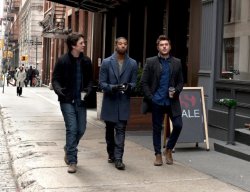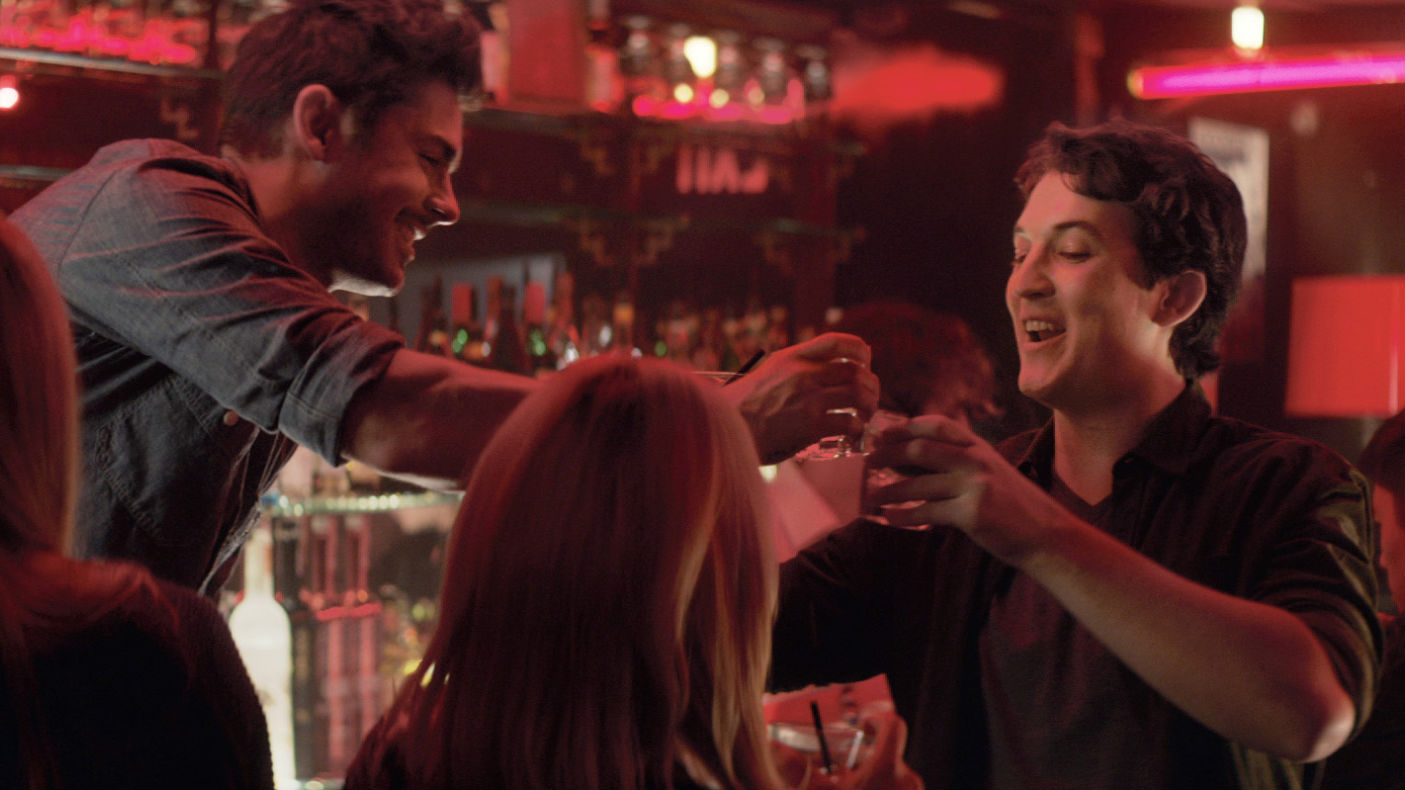That Awkward Moment was originally titled Are We Officially Dating? and labeled a romantic comedy. That was probably more accurate, but since the audience for rom-coms is already in decline, they had to do something to pull in the guys, too. So this bro-focused comedy became That Awkward Moment, which, you'll probably recall, was a popular opening line for Facebook statuses and tweets in early 2013.
 Focus Features
Focus Features"Awkward" was a thing all by itself in the last two years. It became less of a put-down and more of a compliment signaling attractiveness, authenticity, or cute quirks. Usually it also attached itself to funny TV shows or adorkable actresses (hello, Zoe Deschanel) or Forever 21 models. It's faded now, but it was an appealing fad for a while. When this movie poster first showed up, it seemed to be capitalizing on the "awkward" fad: it boasted Zac Efron's dazed-and-confused expression, Michael B. Jordan (The Wire, Chronicle) eating ice cream from the tub, and Miles Teller (The Spectacular Now, Whiplash) holding a teddy bear.
So I was a bit surprised that That Awkward Moment only half-heartedly tried to be the awkward comedy dude-movie it seemed it might be. Instead, it nestled into the most predictable pile of romantic comedy tropes while occasionally grappling with weird urges to be a serious drama. The best thing it does is make us think about what really constitutes "a relationship" (more on that later), but in all the wrong ways.
Teller's teddy bear doesn't even show up.
Three guys in their twenties are best friends and club frequenters. When Mikey (Jordan) becomes abruptly wifeless, Jason (Efron) and Daniel (Teller) swear singleness in order to bring back "that Mikey we knew in college" (Jason's words). When Jason meets a pretty blonde, he continuously avoids "that awkward moment" where it turns into an official relationship in order to continue carousing and keeping the oath.
To avoid that moment, of course, requires plenty more awkward. But not the enjoyable kind.
The story jerked back and forth between comic moments and spontaneously sober shouting matches that seemed to have snuck out of a teen drama. Those rare, precious moments of humor were almost always courtesy of Teller, who salvaged the disjointed cast. But it was uncomfortably quiet in the theater.
Meanwhile, the story itself can only be described as a traditional romantic comedy, except it's dude-centric and there's a lot of genitals jokes (but not in a Apatow way). The elements include but are not limited to the following: walks in Soho with New York City noises accenting the dialogue; twinkly romantic music; the cute girl apologizing for her weird laugh and sitting on a bench saying "You know, when I was a kid . . . "; a concluding public make-up worthy of Kate Hudson.
 FilmDistrict
FilmDistrictBut then it's sprinkled with weird irreverence. There's masturbation and ice cream, flippancy towards divorce, and a would-be tragic death used as a device to bring about the relationship question. In a fight (verbal and fisticuff) between the three leads that the trailer trimmed and slimmed to make comical, a realistic resolution seems completely out of the picture. You feel sorry for no one.
Foggily floating around somewhere beneath this mess is a shaky moral of the story (catering supposedly to dudes) that relationships are worth choosing over hook-ups. Oh yeah, and that keeping them a secret is probably a bad idea.
So what is a relationship exactly?
Because the idea seems to be that if these guys could just come to terms with whatever it means, they could figure it all out. According to Efron's interest, it's "being there for someone when they need you. That's all a relationship is, Jason. That's all it is."
Seriously?
When Mikey expresses remorse over his cheating wife in the beginning, Jason says "Man, this is about ALL of us." And then they make their pact, in an effort to surround the wounded Mikey with camaraderie and bar-hopping buddies.
But as Jason's statement hints, being there is, for his buddies, not about serving Mikey's needs so much as allowing all three men an excuse for blowing others off. It keeps them lying to each other and their would-be significant others. When they're not secretly rendezvousing with would-be girlfriends, they're questioning each other about their varietal conquests.
So in that quasi-climactic fight, when all the feelings come out, it's clear that they've done something wrong. It sounds like just "being there" doesn't really constitute a friendship—let alone a relationship.
 Focus Features
Focus FeaturesMaybe they just didn't know what "being there" should look like in a tangible, healthy way, but they're no closer to knowing by the end of the film. In an attempt to do it right, Jason brings ice cream and liquor to Mikey's apartment after the dust settles, and they sup silently together on the couch.
Whether this was supposed to be funny or satisfying or resolution-bringing is unclear. But on the whole, it was just sad.
Caveat Spectator
There's nudity, sex scenes, and nudity in the sex scenes, none of them adding anything to the already fizzled plot. Three guys take Viagra together and drink every few scenes. Cussing is frequent. Punches are thrown. Many sexual actions are verbally described.
Taylor Lindsay is a writer in New York City. She was Christianity Today Movies' fall intern.












